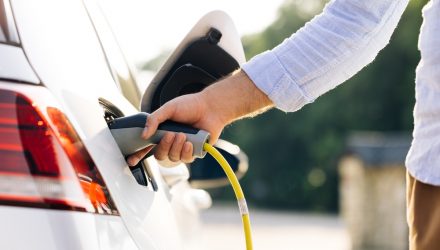The U.S. is one of the world’s largest automotive markets. It’s also integral in the effort to boost the global adoption of electric vehicles (EVs).
Domestic adoption of EVs has been solid. But there are plenty of consumers on the fence about ditching their internal combustion engine vehicles. They all cite a similar issue: lack of adequate charging infrastructure. Solve that and more EVs may be sold in the U.S., potentially benefiting exchange traded funds such as the KraneShares Electric Vehicles and Future Mobility ETF (KARS).
In terms of geographic exposure, KARS is a global ETF. But plenty of the fund’s member firms sell EVs in the U.S. or count those original equipment manufacturers as clients. Said another way, if charging infrastructure improves in the U.S., KARS could be among the prime ETF beneficiaries.
Biden Backing More EV Charging Expenditures
EV charging infrastructure is somewhat dependent on the benevolence of the federal government. Fortunately for investors considering KARS, the Biden Administration wants to drive EV adoption. And it recognizes more charging stations represent an effective avenue for accomplishing that goal.
Recently, the White House announced plans to dole out $623 million to 22 states and territories to bring new EV charging stations online.
“This funding will help ensure that EV chargers are accessible, reliable, and convenient for American drivers while creating jobs in charger manufacturing, installation, and maintenance for American workers,” said Transportation Secretary Pete Buttigieg in a statement.
There is one thing of note to market participants evaluating KARS. Those funds will be distributed across states that aren’t readily associated with broad EV adoption. That could be a sign that if charging improves, adoption could follow suit across a surprising range of jurisdictions.
“The announced grants, split between 22 states and the territory of Puerto Rico, aim to fill numerous and wide gaps in the national EV charging network. The funding will be spent across regions of Georgia, Ohio, and Texas and support a range of projects, including for library patrons in Northern California, apartment dwellers in New Jersey, and e-bike riders in Arizona,” according to Scientific American.
In terms of government spending, there’s more to come on the EV charging front. The aforementioned $623 million represents just a small slice of expected EV charging expenditures.
For more news, information, and analysis, visit the Climate Insights Channel.

